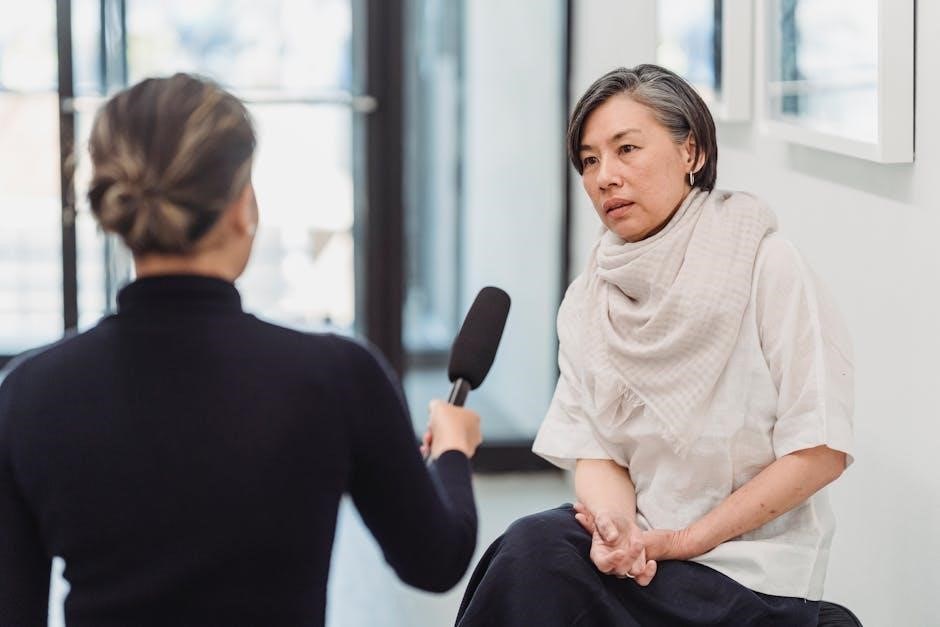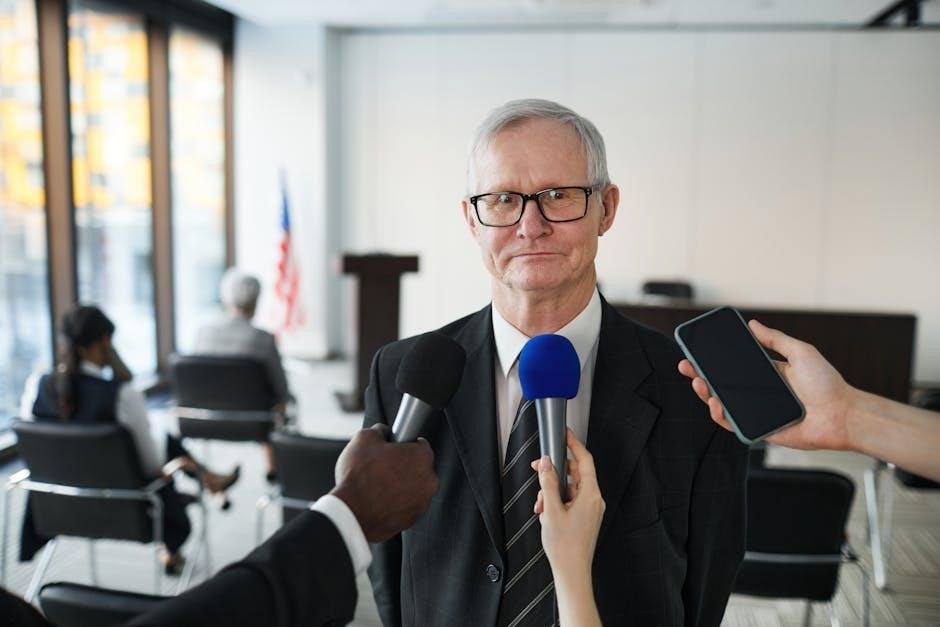An essential guide to mastering the F1 visa interview, this resource provides a comprehensive list of common questions and sample answers, ensuring applicants are well-prepared and confident․
From study plans to financial support, this F1 interview questions and answers PDF covers every aspect, helping candidates navigate the process smoothly and increase their chances of approval․
Overview of F1 Visa Interview Process
The F1 visa interview is a critical step in obtaining a student visa to study in the United States․ During the interview, a consular officer assesses the applicant’s eligibility, intentions, and preparedness for their academic journey․ The process typically begins with the applicant submitting their visa application, paying the necessary fees, and scheduling an interview․ On the day of the interview, applicants must present all required documents, including their I-20 form, passport, financial proof, and SEVIS receipt․ The interviewer will ask a series of questions to evaluate the applicant’s study plans, university choice, financial stability, and post-graduation intentions․ The goal is to demonstrate that the applicant is genuinely pursuing education and intends to return to their home country after completing their studies․ Preparation is key, as the interviewer seeks to ensure compliance with visa regulations and assess the applicant’s credibility․ A successful interview leads to visa approval, while an unsuccessful one may result in denial․ Understanding the process and being well-prepared is essential for a positive outcome․
Importance of Preparing for F1 Visa Interviews
Preparing for an F1 visa interview is crucial to increase the chances of approval․ A well-prepared applicant demonstrates clarity in their academic and career goals, financial stability, and genuine intent to study in the U․S․ Proper preparation involves researching common questions, organizing documents, and practicing responses․ This helps in presenting a confident and authentic image, which is key to convincing the consular officer of the applicant’s credibility․ Without adequate preparation, applicants risk appearing uncertain or unclear about their plans, which can lead to visa denial․ Utilizing resources like F1 visa interview questions and answers PDF guides can significantly enhance readiness, ensuring that applicants address all potential inquiries effectively․ Ultimately, thorough preparation not only boosts confidence but also streamlines the interview process, making it more likely to achieve a successful outcome․

Common F1 Interview Questions
Interviews often focus on study plans, university choice, financial support, post-graduation plans, and academic background․ Being prepared to address these areas confidently is key to a successful F1 visa interview process․
Questions About Study Plans
Questions about your study plans are central to the F1 visa interview․ Be ready to discuss your academic goals, why you chose your specific program, and how it aligns with your career aspirations․ Officers often ask about your intended coursework, research interests, and how your studies will benefit your home country․ It’s crucial to demonstrate a clear understanding of your program and how it fits into your long-term plans․ Additionally, be prepared to explain how your studies will prepare you for future opportunities, whether in your home country or elsewhere․ Providing specific examples and a detailed timeline can showcase your commitment and seriousness about your education․ A well-articulated study plan not only reflects your dedication but also assures the interviewer of your intent to return home after completing your studies, which is a key factor in visa approval․
Questions About University Choice
Questions about your choice of university are common in F1 visa interviews․ Officers want to understand why you selected a specific institution and how it aligns with your academic and career goals․ Be prepared to discuss the reputation of the program, faculty expertise, and resources available at the university․ You may also be asked why you chose the United States over other countries for your education․ Highlight specific factors such as the curriculum, research opportunities, and campus culture that influenced your decision․ Additionally, explain how the university’s location and environment will support your studies and personal growth․ Demonstrating a clear understanding of the university and its offerings shows that you have done thorough research and are committed to making the most of your educational experience in the U․S․ This helps reassure the interviewer of your genuine intentions and preparedness for studying abroad․
Questions About Financial Support
Financial support is a critical topic in F1 visa interviews, as it ensures you can cover living and educational expenses in the U․S․ Be prepared to provide detailed information about your funding sources, such as scholarships, personal savings, or sponsorship from family or organizations․ Officers may ask for proof of financial stability, so ensure you have all necessary documents, including bank statements, sponsorship letters, and your I-20 form․ You may also be asked about your understanding of tuition fees, living costs, and how you plan to manage expenses without working illegally․ Highlighting your financial preparedness demonstrates responsibility and commitment to your studies․ It’s important to be transparent and provide clear, concise answers to avoid raising concerns about your ability to support yourself․ This section of the interview is vital for verifying your eligibility and ensuring compliance with visa regulations․

Questions About Post-Graduation Plans
Post-graduation plans are a common topic in F1 visa interviews, as they help assess your intentions and commitment to returning to your home country․ Be prepared to discuss your career goals, how your U․S․ education will benefit your home country, and any plans for further education or employment․ Officers may ask how you intend to apply the knowledge and skills gained in the U․S․ to contribute to your home country’s development․ You may also be asked about your long-term aspirations and how they align with opportunities back home; It’s important to demonstrate a clear understanding of your future plans and how they tie back to your home country․ This shows that you have a strong intent to return after completing your studies, which is a key factor in visa approval․ Providing thoughtful and realistic answers will help build confidence in your application․
Questions About Academic and Professional Background
Questions about your academic and professional background are designed to evaluate your qualifications and readiness for studying in the U․S․ Be prepared to discuss your previous academic achievements, such as your undergraduate degree, GPA, and relevant coursework․ You may also be asked about your work experience, internships, or research projects, especially if they relate to your field of study; Officers will assess how your background aligns with the program you’re applying to and your ability to succeed․ It’s important to highlight any academic honors, skills, or experiences that make you a strong candidate․ Providing specific examples and explaining how your background has prepared you for graduate studies will demonstrate your readiness and commitment․ This section of the interview helps officers understand your capabilities and how you’ll contribute to your chosen program․ Clear and concise answers will strengthen your application․

Preparing for the F1 Interview
Thoroughly research the visa process and practice answering common questions to build confidence and clarity in your responses, ensuring a smooth interview experience․
Engage in mock interviews and organize your documents effectively to demonstrate preparedness and professionalism during the F1 visa interview process․
Tips for Answering Common Questions Confidently
Be honest and specific when answering F1 visa interview questions, ensuring your responses align with your study plans and long-term goals․
Research your chosen university thoroughly and practice explaining why it aligns with your academic and career aspirations․
Review your financial documents and be ready to clearly explain your funding sources and how they cover tuition and living expenses․
Practice answering questions about your post-graduation plans, emphasizing your intent to return to your home country․
Engage in mock interviews to improve your communication skills and maintain a positive, confident attitude during the interview․
Practice Techniques for Successful Interviews
One effective practice technique is conducting mock interviews with friends, mentors, or advisors to simulate real interview scenarios and refine your responses․
Record your practice sessions to identify areas for improvement, such as body language, tone, and clarity of speech․
Utilize online resources, such as F1 visa interview questions and answers PDF guides, to familiarize yourself with common inquiries and prepare thoughtful answers․
Develop a checklist of key points to cover for each question, ensuring you address all aspects without unnecessary details․
Engage in role-playing exercises where someone assumes the role of the interviewer, helping you build confidence and adaptability in responding spontaneously․
Practice maintaining eye contact, speaking clearly, and using confident gestures to convey professionalism and sincerity during the interview․

Document Preparation for F1 Interviews
Proper document preparation is crucial for F1 interviews․ Ensure all required documents, such as your passport, I-20, financial statements, and admission letters, are organized and readily available․ This demonstrates responsibility and preparedness․
Essential Documents to Bring to the Interview
When preparing for your F1 visa interview, it is critical to gather and organize all necessary documents to demonstrate eligibility and intent․ Start with your passport, ensuring it is valid for at least six months beyond your intended stay in the U․S․ Next, bring your I-20 form, which confirms your admission to a SEVP-approved institution․ Financial documents, such as bank statements, scholarship letters, or loan approval letters, are required to prove sufficient funding for your studies․ Additionally, include your admission letter from the university and any academic transcripts or diplomas․ If applicable, bring proof of employment or property ownership in your home country to demonstrate ties․ Organize these documents in a clear, accessible manner to efficiently answer questions during the interview․ Having originals and copies of all documents ensures you are prepared for any requests․ Proper preparation of these materials can significantly enhance your chances of a successful interview․
How to Organize Your Documents Effectively
Organizing your documents efficiently is key to a successful F1 visa interview․ Start by gathering all required documents, such as your passport, I-20 form, financial statements, admission letter, and academic transcripts․ Use a binder or folder with clear sections or tabs to categorize each type of document, making it easy for the interviewer to locate specific information․ Ensure your passport is valid for at least six months beyond your intended stay and place it at the front for quick access․ Keep original documents separate from copies, and consider having a digital backup as well․ Arrange items in a logical order, starting with the most critical documents like the I-20 and financial proofs․ This structured approach not only saves time but also demonstrates professionalism and preparedness, enhancing your overall presentation during the interview․

Understanding Visa Approval and Denial
Visa approval hinges on clear study plans, financial stability, and strong ties to your home country․ Denial often results from unclear goals, insufficient funds, or suspected immigration intent․
Common Reasons for F1 Visa Approval
A well-prepared application and confident interview significantly increase chances of approval․ Clear study plans, strong academic records, and sufficient financial support are key factors․ Demonstrating ties to your home country, such as family or job opportunities, also strengthens your case․ A coherent explanation of your choice of university and program aligns with your future goals․ Proper documentation, including admission letters and financial statements, is essential․ Fluency in English and a positive attitude during the interview further enhance credibility․ Officers favor applicants who show genuine intent to study and return home after completing their education․
Common Reasons for F1 Visa Denial
Several factors can lead to F1 visa denial, primarily due to insufficient documentation or unclear intentions․ Lack of strong ties to your home country, such as family or employment, may raise concerns about your intent to return after studies․ Incomplete or inconsistent financial proof, including bank statements or sponsorship letters, can also result in denial․ Additionally, vague or unrealistic study plans, poor academic performance, or low English proficiency may negatively impact your application․ Failure to demonstrate a clear understanding of your chosen program or its alignment with your career goals can raise doubts․ In some cases, inadequate preparation for the interview, such as inability to answer questions confidently, may lead to rejection․ Proper documentation and a well-articulated vision are crucial to avoiding these common pitfalls․